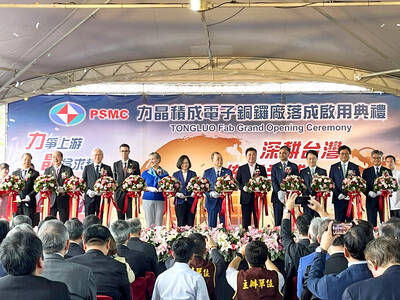Products across the board saw declines in export orders last month, except for information and communications technology (ICT) items, as orders dropped for the eighth consecutive month, the Ministry of Economic Affairs said yesterday.
Orders totaled US$38.5 billion, down 4.5 percent year-on-year, with cumulative orders in the first six months decreasing 6.5 percent to US$222.86 billion, the ministry said.
Orders for ICT products rose by 4.7 percent to US$11.09 billion, which the ministry attributed to a growth in orders of high-priced laptops and the impact of frontloaded laptop orders.
US orders for ICT products, Taiwan’s biggest market in the segment, increased by US$510 million year-on-year, taking up to 41.5 percent of the sector’s total orders, the ministry said.
Orders for electronics products slipped 4.3 percent to US$9.93 billion due to weak global demand and plunging DRAM chip prices, it said.
While China and Hong Kong remain the biggest markets for Taiwanese electronics products, their export orders in this category declined by US$540 million from a year earlier, while orders to the US increased by US$220 million, the ministry said.
Due to an oversaturated flat-panel market, the result of increasing Chinese production, optoelectronics orders dropped by 8.5 percent to US$1.85 billion, with orders for China and Hong Kong declining by US$160 million, it said.
Machinery makers continued to suffer from the US-China trade dispute, with their export orders dropping 22.3 percent to US$1.64 billion, while base metal products saw a 15.7 percent decrease to US$2.11 billion, with the US cutting orders by US$160 million, the ministry said.
Petrochemical products and plastics/rubber products were also affected by sluggish market demand caused by the US-China dispute, with orders contracting by 18.5 percent and 9.6 percent respectively, to US$1.63 billion and US$1.83, the ministry said.
Falling international crude oil prices also contributed to the declines, it added.
Overall, the nation’s export orders to the US hit a record high at US$11.7 billion, up 6.8 percent year-on-year and making it the nation’s biggest overseas market, while China and Hong Kong followed closely at US$9.35 billion, down 14.6 percent year-on-year, it said.
Europe came in third with a 5.3 percent yearly decline to US$6.75, due to slipping orders of petrochemicals and base metal products, while ASEAN and Japan ranked fourth and fifth respectively, with orders increasing by 13 percent and 7.9 percent.
Orders are unlikely to pick up if the US-China dispute drags on, because that would result in slow global demand and falling metal and crude oil prices, the ministry said.
A survey of exporting companies also suggested that orders would further decline this month, it said.

ARTIFICIAL INTELLIGENCE: The chipmaker last month raised its capital spending by 28 percent for this year to NT$32 billion from a previous estimate of NT$25 billion Contract chipmaker Powerchip Semiconductor Manufacturing Corp (力積電子) yesterday launched a new 12-inch fab, tapping into advanced chip-on-wafer-on-substrate (CoWoS) packaging technology to support rising demand for artificial intelligence (AI) devices. Powerchip is to offer interposers, one of three parts in CoWoS packaging technology, with shipments scheduled for the second half of this year, Powerchip chairman Frank Huang (黃崇仁) told reporters on the sidelines of a fab inauguration ceremony in the Tongluo Science Park (銅鑼科學園區) in Miaoli County yesterday. “We are working with customers to supply CoWoS-related business, utilizing part of this new fab’s capacity,” Huang said, adding that Powerchip intended to bridge

Microsoft Corp yesterday said that it would create Thailand’s first data center region to boost cloud and artificial intelligence (AI) infrastructure, promising AI training to more than 100,000 people to develop tech. Bangkok is a key economic player in Southeast Asia, but it has lagged behind Indonesia and Singapore when it comes to the tech industry. Thailand has an “incredible opportunity to build a digital-first, AI-powered future,” Microsoft chairman and chief executive officer Satya Nadella said at an event in Bangkok. Data center regions are physical locations that store computing infrastructure, allowing secure and reliable access to cloud platforms. The global embrace of AI

INFLATION WATCH: A rate hike in March would help keep inflation at 2.16 percent this year, although a weak currency and higher electricity rates are an issue, S&P said Moody’s Ratings and S&P Global Ratings have reaffirmed Taiwan’s sovereign credit ratings at “As3” and “AA+” respectively with a stable outlook on the back of high income and wealth levels, a strong institutional framework and robust external positions. The affirmations came as Taiwan’s economy is gaining momentum after quarters of slowdown induced by stubborn global inflation and monetary tightening. Taiwan’s strong fiscal and external buffers have improved relative to peers as evidenced by recent shocks linked to the COVID-19 pandemic and the ongoing US-China technology dispute, the two ratings firms said. “Taiwan stands as the epicenter of the global semiconductor supply chain, accounting

RIDING AI WAVE: : Most of its NT$15bn capital budget would be spent on packaging technologies used in AI and HPC chips and advanced testing technology, it said Chip testing and packaging service provider Powertech Technology Inc (PTI, 力成科技) plans to increase this year’s capital expenditure by 50 percent to expand capacity to meet growing demand for advanced memorychips used in artificial intelligence (AI) products. The company proposed to spend NT$15 billion (US$460.94 million) to expand advanced capacity and equipment, compared with a budget of NT$10 billion it planned three months ago. “We are seeing a recovery in market demand as well as new business opportunities. We will spend heavily on advanced packaging” equipment, Powertech chief executive officer Boris Hsieh (謝永達) told investors on Tuesday. “We will focus on ramping